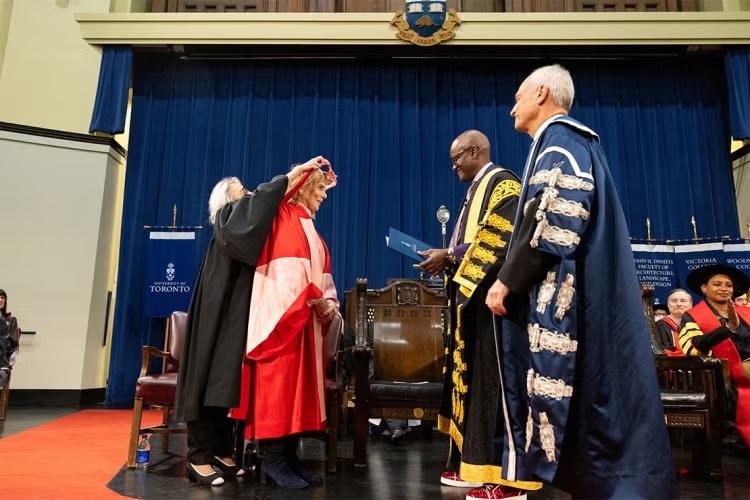January 13, 2025 | Alumni
Toronto gallerist and art pioneer Jane Corkin receives U of T honorary degree
By Scott Anderson

Photo by Johnny Guatto.
At a time when images have become such a powerful cultural force, it’s odd to think that, as recently as 50 years ago, photography was not commonly considered a serious art form. Many galleries didn’t show it and the few that did were often considered outsiders.
Jane Corkin has been a driving force in changing perceptions. From the time she began curating in the 1970s, the Toronto gallerist has been championing photographers and their work in Canada and around the world.
Recently, for her role as a pioneering gallerist and leading advocate for the art of photography in Canada and abroad and for helping to make Toronto a hub for modern and contemporary art, Corkin received a Doctor of Laws, honoris causa, from the University of Toronto.
Corkin grew up in Boston, the third of four siblings. Her father, a self-educated, successful entrepreneur and dedicated philanthropist died when she was 11, casting her into a role, she says, of wanting to make sure the rest of the family “were all OK.”
She recalls getting interested in art as a child, painting after school and taking art lessons. For a birthday, she might receive an art book on Van Gogh or Monet. “Those were great presents for me,” she says. She was also the one who took photos at family get-togethers.
Corkin moved to Canada in 1967 at age 17 to attend Queen’s University in Kingston, Ont. She initially studied political science because, she says, “At a time of unrest, it seemed I should do something more important in the world than just study something I loved.” Those feelings changed though and she switched her major to art history, earning a bachelor of arts degree in 1972.
At Queen’s, she took photographs – often portraits – for the student newspaper, the Queen’s Journal, and grew interested in acquiring photographs as artworks. “I started buying pictures when I was at university,” she told the Toronto Star in 2014. “Photographs were not expensive then.”
After graduating, Corkin landed a job at David Mirvish’s gallery on Markham Street in Toronto and continued to shoot portraits in her spare time. On a trip to New York, she met the Hungarian-American photographer André Kertész, known for his photo essays and unusual camera angles.
Inspired, Corkin organized the Mirvish Gallery’s first-ever photography exhibition. She began representing photographers for the gallery and several years later, after Mirvish closed shop, Corkin took over that part of the business. So, it seemed a natural next step to open her own gallery focusing on photography – which she did in 1979. Corkin Gallery was located in a one-time shoe factory on Front Street – far from Yorkville, then the nucleus of Toronto’s art scene.
Opening a gallery dedicated to photography wasn’t an obvious decision. “Photography was considered a new media,” Corkin told Artoronto.ca in 2019. “Even [now renowned artists such as] Nan Goldin and Diane Arbus were part of the outsider movement. There were not many people who understood the art that I was showing.”
Because Corkin represented photographers and demonstrated a willingness to show other “unusual” artforms such as ceramics and furniture, she says she was considered a renegade within Toronto art circles: “I was doing something different.”
As a young gallerist, Corkin was naturally drawn to emerging artists and believed in connecting artists from different places who are asking similar questions. “We are always thinking about artists who live and work here in Toronto within a context of international artists,” she says.
Her efforts got noticed. It wasn’t long after her gallery opened that Maclean’s magazine dubbed her Canada’s “first lady of photography.” Now, decades into her career, she still bristles with energy – with one Toronto Star interviewer suggesting she’s a testament to the adage: “Do something you love and you’ll never work a day in your life.”
Of course, like any entrepreneur, Corkin has experienced her share of business challenges. She’s worked hard in Canada to build a culture of appreciation around fine art like the one that exists in Europe. “Canada isn't a country where people think they need art,” she says, adding that she believes this is a missed opportunity.
“I think it’s so important to the whole human being,” she says, “to see art and to really look at it. To put away your cell phone, turn it off and stare at something and have it speak to you.”
It’s among the messages she hopes that graduating students from the Faculty of Arts & Science, the John H. Daniels Faculty of Architecture, Landscape, and Design and the Munk School of Global Affairs & Public Policy took away from her remarks in Convocation Hall.
In 2000, Corkin began looking for a new gallery space and eventually found one she loved in Toronto’s Distillery District. Her new gallery still shows photography, but also contemporary artists in all media.
And, two years ago, Corkin was appointed to the board of trustees of the International Center of Photography in New York – a role that underscores her contributions to the international art community and her ongoing commitment to advancing the cultural fabric of Canada and beyond.

